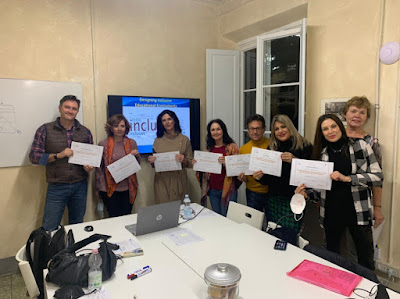DESIGNING INCLUSIVE LEARNING ENVIRONMENTS
Europass Teacher Academy - Florence
29th November to 4th December 2021.
The main objective of this mobility was to reflect on the importance of designing learning environments that support all our students differences and rethinking our teaching.
Day 1 - 29th November 2021.
We started reflecting on what diversity is and how inclusive education must support that diversity:
During the session we discussed on the different types of diversity that may result more challenging for us nowadays.
Day 2 - 30th November 2021.
We started with a question to reflect on:
"What is inclusion?"
Inclusion refers to an active, intentional and ongoing engagement with diversity.
Something really important from this session is the fact that we must consider our students differences a question of all teachers, not only of those dealing with a particular student. Diversity and inclusion must be dealed with from a collaborative point of view.
We also discussed about the differences between the Medical and Social Models used to refer to diversity problems and how they were implemented throughout the years:
We also studied the Portuguese system to approach inclusion at schools, since they seem to be the most advanced country regarding inclusive schools.
They work as cluster schools (Agrupamento de Escolas) with Special Education schools serving as reference or training centers.
This screenshot show us the main six ingredients where to start adapting our teaching practice to inclusion:
From this session I would keep these two main ideas:
1. Inclusion must provide CHOICES for the students (they can choose different ways to approach their learning process)
2. And MOTIVATION as a key factor (engagement in objectives, activities and processes)
Day 3 - 1st December 2021.
We started this session analyzing different reflection tools on the inclusion culture, policies and practices.
The Toolkit , with a database of over 150 resources, most of them summarized in 23 languages, helps school leaders, teachers, parents and others to make education more inclusive, thereby preventing early school leaving.
The tool is based on the NESET report Structural Indicators for inclusive systems in and around schools and was developed with primary and secondary schools in mind.
We also studied the Index for Inclusion, that presents the most detailed explanation of what an inclusive school should look like.
UDL (Universal Design for Learning) is of key importance when redesigning our teaching learning processes, since it will provide:
1. Optimization of individual choice and autonomy.
2. Relevance, value and authenticity.
3. Different options to access, presenting and managing information.
In this regard, we can find the Self-Determination Theory (SDT), which focus on intrinsic motivation:
- Challenge (not too high)
- Autonomy (choices for self-disposition and self-management)
- Relatedness (to a group / team / class / school)
From this session, I would keep the concept of diversity (what we have) vs differentiation (how we tackle that diversity), bearing in mind that our lesson plans sometimes do not fit every student. We must get out of our "comfort zone" (design for an illusionary average student) and try the UDL approach:
Day 4 - 2nd December 2021.
During this session we focused more on UDL (Universal Design for Learning)
Then we learn more about the different learning styles and how they can relate to their level and adaptation of the Curriculum.
Day 5 - 3rd December 2021.
We started learning about Curriculum modification:
And we practiced in groups about these modifications and how they are implemented in the classroom with differente practical examples.
This relates as well to Tiered Instruction and UDL:
And the different ways to Tier a Lesson:
1. Tier by challenge level (according to Bloom's Taxonomy)
2. Tier by complexity (Address the needs of students at introductory levels, as well as students who are ready for more advanced work)
3. Tier by resources (Choose materials at various reading levels and complexity of content)
We visited the site of Inclusion Europe with tips on how to make our documents and lessons easier to read:
And how to use different ways to present information, for instance, using Story Maps or Mind Maps. And also some tools to create them, such as:
We also have a look at different tools for evaluation, gamification and support our students:
And a shallow look at PBL (Project Based Learning) and Flipped Classroom.
Another interesting approach is Group Rotation:
"Let the students have a choice!"
And finally came the moment to receive our certificates!
Day 6 - 4th December 2021.
The last day of the course was devoted to know the area of Tuscany with a guided excursion planned by Europass Teacher Academy: Pisa, San Gimiggiano and Siena.
I leave here some pictures of the trip and also some of Florence, which was a really beautiful place to enjoy such a complete course like this one.
































































